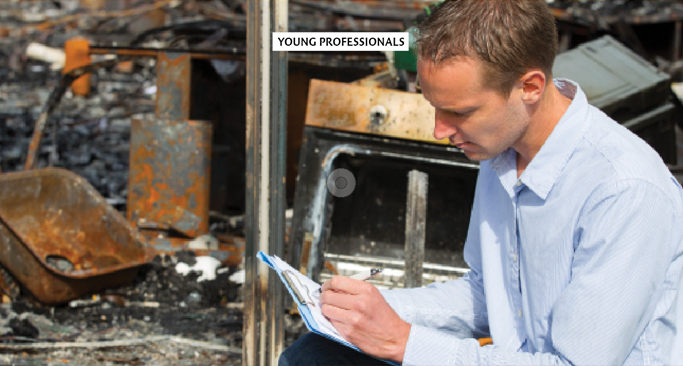5 things every agent should know
By Bill Brooker
I think I need to begin with a story.
Before becoming an agent, I worked as a field property claims adjuster for a respectable regional carrier in Ohio. My territory encompassed some parts of Cleveland that required significant attention, to say the least.
One day, I received a fire claim assignment in one of these areas. Our insured was a landlord and his tenant had fallen asleep while cooking with grease on the stove. This was no different than many other fire claims I had worked on, so I began walking through the house to get an idea of the extent of the damage. The kitchen was completely black and almost unrecognizable as a room. The rest of the house, including a young girl’s bedroom filled with stuffed animals and pink walls, had heavy char and smoke damage.
Not long after I began writing my estimate, a car pulled up with the tenants inside. A little girl about four years old got out and went inside into her bedroom. She was visibly shaken by what had certainly been a horrific night for the family. The mother yelled to her daughter that she could take one stuffed animal back with her to where they were staying. The daughter emerged with a pink teddy bear that looked just like the one a Breaking Bad fan would recognize.
The mother approached me and asked, “Are you the guy from the insurance company?” I told her I was with the insurance company that covers the building. Then she asked, “Are you who we talk to in order to replace all of things?” I responded “No. You will need to talk with whoever you have your renter’s insurance through.”
“Oh,” she sighed.
In that moment, I witnessed a mother’s realization that they had lost about 90% of their possessions and no check was coming because none of it was insured.
Those are the stakes in the world of claims. I will never forget that mother’s face as long as I live, and I hope that story helps those without a claims background understand that claims is a whole lot more than a new roof or a lost diamond ring. As an agent, you will need to understand the seriousness of claims and give them the respect they deserve.
Moving from the claims world and coming over to the agency side after five years, I knew I wanted to use that experience to help my clients. Claims were the only thing I knew and I wanted to at least use that to make a difference.
Now, after being on the agency side for a while, I am pleased to share some advice and insights for agents beginning their careers. Here are five things I believe every agent should know about handling claims early in their career.
- Claims are emotionally taxing for the insured. Much of what we do as agents is focused on protecting against financial risks, but imagine being sued by an employee you’ve known for 20 years or being asked to list every item in your house on a piece of paper after they’ve been lost in a fire. As an insurance advisor, we promise peace of mind. A large part of that promise is ensuring that the coverage is there when needed.
Another crucial aspect of that is stepping up and assuring your insured that their agent is on top of things. Being organized, understanding relevant policy language, answering the phone when called, and remaining calm throughout the process are all important.

In that moment, I witnessed a mother’s realization t
hat they had lost about 90% of their possessions and
no check was coming because none of it was insured.
- Claims present a significant opportunity for you. Your insured hired you specifically for moments like these. Claims are never good for the insured, but they can be an excellent opportunity for you as an agent to affirm the decision they made when they chose to hire you as their agent.
What kind of agent will you be? In 10 years, what will you tell prospective clients when they ask you what you have done in various claims scenarios? An out-of-this-world claims experience will not only be a lift off of your insured’s shoulders but it will also be the reason they never leave you. It can also be the reason they recommend you to their friend who happens to own the biggest thing in town.
Being an agent is about building relationships and fostering referrals. If you drop the ball in a claims situation, you won’t be doing much of either.
- Understand your role and that of the claims adjuster. As you know from the opening story, I was a claims adjuster early on in my career and that provided me with some great understanding. I can tell you that as an adjuster you are looking to settle claims in a quick and efficient manner while maintaining high levels of customer service with the insured every single time. If your insured is making multiple calls to the claims adjuster every day and proving difficult to work with, there may be an opportunity for you to step in and calmly find out how to get things back on track.
If breakdowns occur in the claims handling process, approach the situation from a place of trying to help the adjuster work through their process on the claim while reminding them of your insured’s top concerns. This also means doing your job as a professional and giving your insured news that they do not want to hear. In those moments, try to simply explain the coverage and how the policy is or is not being applied.
Sometimes your best efforts to soften the blow will not be enough for your insured. Use those instances as learning experiences and reminders of how to handle difficult conversations.
- Document everything. My claims manager used to tell me, “Photos are free.” It never hurts to over-document things. This is a rule to live by for everyone involved in a claim.
Recently, I had an equipment breakdown claim where an industrial AC unit burned out. The insured needed a replacement AC unit put in immediately and had a new temporary unit installed. When the claims adjuster got out to the scene, they reviewed the parts of the unit that were damaged and wrote an estimate for the replacement of those parts.
However, the estimate did not include replacement for all the parts that were damaged by the fire department cutting their way into the unit to extinguish the fire. Thankfully my insured, the HVAC company and I took plenty of photos prior to the emergency unit’s being installed, which clearly showed more damage than what was on site when the adjuster arrived. The adjuster approved an increased estimate based on those photos and an additional payment was released.
Ultimately, photos make your job easier in communicating with the insured and advocating on their behalf if something does get missed by the adjuster.
- Listen to the words of advice and the words of warning from your mentors. Every experienced agent has examples of claims that have gone really well and perhaps a few nightmare scenarios to share with you. Listen to these people in your life who can impart valuable knowledge to you. There is without a doubt, over time, a sixth sense that you develop where you can anticipate how a claim will unfold right from the first conversation you have with the insured.
Engage with the agents at your agency who have this sixth sense already and they will be glad to share their war stories with you.
I began this article with a story that has profoundly impacted my life. Any agent you meet who has been in the industry for over 10 years will have a story of some kind to share, one that they still think about from time to time. Someday, you too will have a collection of stories to share with the new agent in your office.
 The author
The author
Bill Brooker is a fourth-generation risk advisor at Brooker Insurance Agency in Strongsville, Ohio. Bill serves clients and non-clients alike, offering third-party insurance reviews, and speaks as a topic expert in the field of risk management. Bill is a firm believer in agents helping agents and welcomes anyone to reach out to him via his LinkedIn profile.






